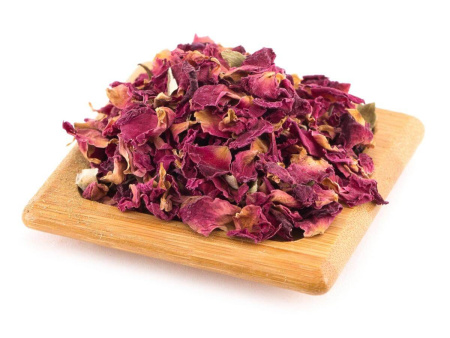-
0 Saturation
-
0 Aftertaste
-
0 Aroma
-
0 Effect
-
0 Balance
-
0 Body
Rose Petal Herbal Tea – A Refined Delight from China
In China's rich tea culture, a special place is occupied by the exquisite rose petal drink known as Mei Gai Hua Cha (玫瑰花茶, Méiguī huāchá). This exquisite tea, capturing the aroma of a blooming garden, is more than just a drink, but a true work of art, fusing centuries-old traditions with modern production technologies.
Rose petal herbal tea is an exquisite beverage made from dried rose petals grown in ecologically pristine regions of China. Chinese rose varieties are renowned for their delicate aroma and rich nutritional content. This tea is traditionally used in Chinese medicine for its healing properties.
Roses have been used in tea culture for over a thousand years. The first mentions of the medicinal uses of rose petals appear in ancient medical treatises from the Tang Dynasty (618-907).
In Chinese culture, rose tea is often associated with romance and femininity. It is traditionally used at weddings as a symbol of love and harmony. In modern China, this drink is especially popular among young women, who value not only its taste but also its beneficial effects on beauty and health.
The main growing regions are in the provinces:
Yunnan, where the mountain climate and fertile landscapes create ideal conditions for growing tea roses. Fujian, renowned for its ancient tea-growing traditions. Guangdong, where roses are grown on environmentally friendly plantations using sustainable farming methods.
Petals are harvested by hand at dawn, when the concentration of essential oils in the flowers is at its highest. Only fully opened buds are picked, avoiding wilted or damaged flowers.
Healing properties
In traditional Chinese medicine, rose tea is credited with numerous beneficial properties, many of which have been confirmed by modern research: regular consumption of rose tea improves digestion and normalizes gastrointestinal function; the essential oils contained in the petals have a mild calming effect, helping to cope with stress and insomnia; and the high content of vitamin C and antioxidants support the immune system and slow the aging process.
The health benefits of rose petal tea
- Rich in antioxidants, it protects the body's cells from damage and slows down the aging process.
- Maintains healthy skin – helps improve the condition of the skin, giving it a healthy appearance.
- Improves digestion – helps cope with bloating, improves metabolism and supports the functioning of the gastrointestinal tract.
- Relieves stress and fatigue – has a mild relaxing effect, reducing anxiety levels.
- Supports hormonal balance – may help with discomfort associated with hormonal changes.
How to brew rose petal tea?
To obtain the perfect drink, Chinese masters use the following brewing method:
- Use a clear glass teapot to watch the petals unfold.
- Heat the water to a temperature of 85-90°C – boiling water can spoil the delicate aroma of roses.
- Place 2-3 grams of petals in 200 ml of water.
- Let it steep for 3-5 minutes, watching as the petals slowly open, turning the water a soft pink color.
- You can enjoy the drink either hot or chilled.
Rose tea can be enjoyed neat or combined with honey, lemon, and other herbs. Its gentle action makes it perfect for morning or evening tea.
Modern production and innovation
Today, Chinese rose tea producers successfully combine centuries-old traditions with modern technology. Innovative drying and packaging methods are being implemented to better preserve the product's beneficial properties and aroma. At the same time, they strictly adhere to environmental production standards, making the quality of Chinese herbal rose tea among the best in the world.
Chinese rose petal tea is not only a refined beverage with an exquisite taste, but also a natural source of health benefits. Its aroma is relaxing, its taste is delightful, and its beneficial properties make it an excellent choice for connoisseurs of natural herbal teas. Discover the delicacy and grace of Chinese rose tea!
|
Country
|
China |
- Reviews
- Vkontakte














































































